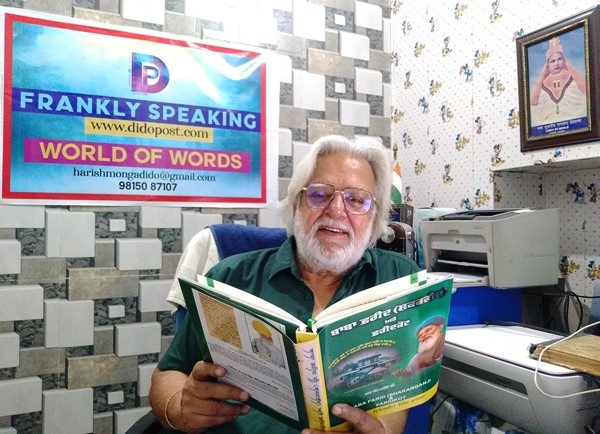
BABA FARID – a dedicated God-loving soul
BABA FARID – a dedicated God-loving soul
HARISH MONGA
ਆਪਣਾ ਲਾਇਆ ਪਿਰਮੁ ਨ ਲਗਈ ਜੇ ਲੋਚੈ ਸਭੁ ਕੋਇ ॥ ਏਹੁ ਪਿਰਮੁ ਪਿਆਲਾ ਖਸਮ ਕਾ ਜੈ ਭਾਵੈ ਤੈ ਦੇਇ ॥੧੩॥
Love cannot be gotten by self, even if one so tries. Such cup of love is of creator, who so liked is given.
Baba Farid was a Muslim Sufi mystic. He is respectfully known as Baba Farid or Sheikh Farid by the Muslims, Sikhs and Hindus of the Punjab region. He was a Sunni Muslim and one of the founders of the Chishti Sufi order. Sheikh Farid was a dedicated God-loving soul.
Farid was a Sufi preacher and one of the most significant saints in Punjab during the 12th century. It won’t be wrong to call him the first poet of the Punjabi language because of his inspiring and life-related poetry, the sacred book of Sikhs, ‘Shri Guru Granth Sahib’, has many of Baba Farid’s works. Though he was Muslim, he was respected by Hindus as well.
Baba Farid was born in the month of Ramzan in 1173 CE at Kothewal village, Punjab (now in Pakistan). Early in his life, the title of ‘Shakar Ganj’ (treasury of Sugar) was added to his name; there is a legend behind this. Baba Farid was asked to offer daily prayers as a young boy by his mother. After asking what he’d get after saying his prayers, Baba Farid’s mother replied that she would give him sugar once he was done. Baba Farid’s mother used to hide sugar under his prayer mat and after the completion of his prayers; she used to give him that sugar as a reward. One day Baba Farid’s mother forgot to keep sugar under the carpet, but to her surprise, after his prayers, she found the sugar under the prayer mat. Since that day she started calling her son ‘Shakar Ganj’.
Baba Farid was just 16th years old when he was sent on the Hajj, where he stayed at Abdul Rahim Ansari’s home. After seeing Baba Farid’s command and fluency in Punjabi, a faqir foretold that he would become a great saint one day. After coming back to Punjab Baba Farid was sent to Delhi to learn theology. Baba Farid was a learned man who knew Arabic, Persian and other languages as well, but he was so attached to the Punjabi language that he wrote all his couplets in Punjabi. Baba Farid polished the Punjabi language for literary work. At that time Punjabi was considered to be a less sophisticated folk language and far away to be used for poetry. Moreover, before Baba Farid’s work, Punjabi literature didn’t have as much substance as it enjoys today and was limited to just a few anonymous ballads.
Present-day Faridkot (Punjab), got its name from Baba Farid. It is said that Baba Farid stopped by the city known as Mokhalpur and sat in isolation for forty days near the fort of King Mokhal. The king was impressed by this divine person and named the city after him. The place where Baba Farid sat is known as Tila Baba Farid. To remember his arrival in the city, each year a three days festival known as Bābā Sheikh Farād Āgman Purb Melā’ is celebrated from 21st Sep to 23rd Sep.
Baba Farid died of Pneumonia in 1266 CE, the fifth day of the month of Muharram. He was buried outside the town of Pak Pattan. Pak Pattan was created by him as a place of great Sufi thoughts. The place where he was buried is known as Martyr’s Grave. His successors are known as Chistis. It wouldn’t be wrong to call him the founder of Punjabi literary tradition and modern Punjabi culture.




